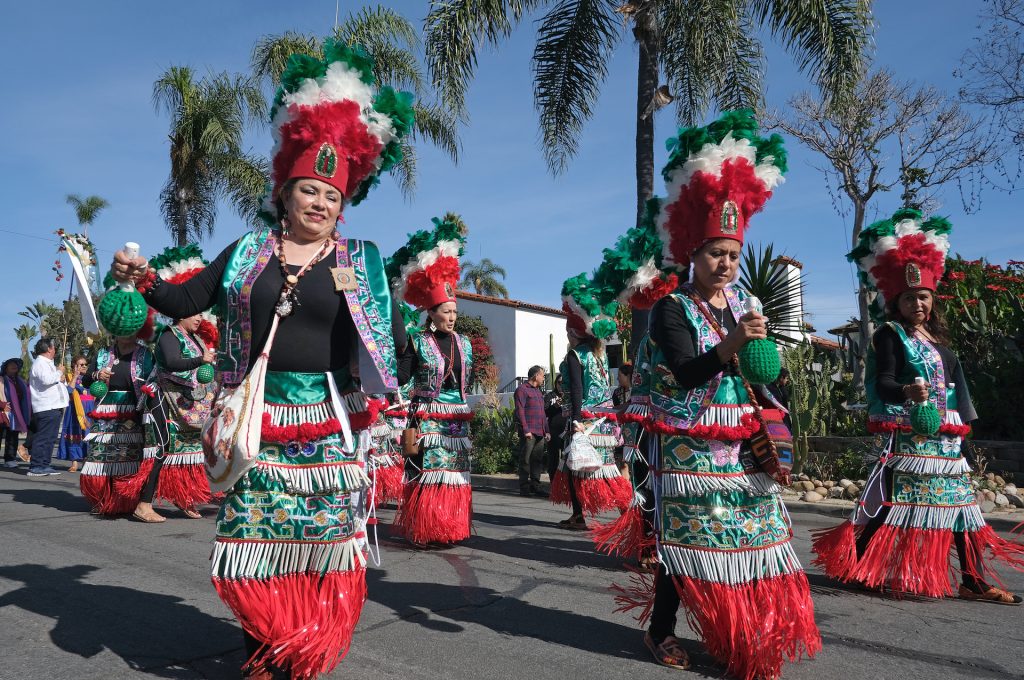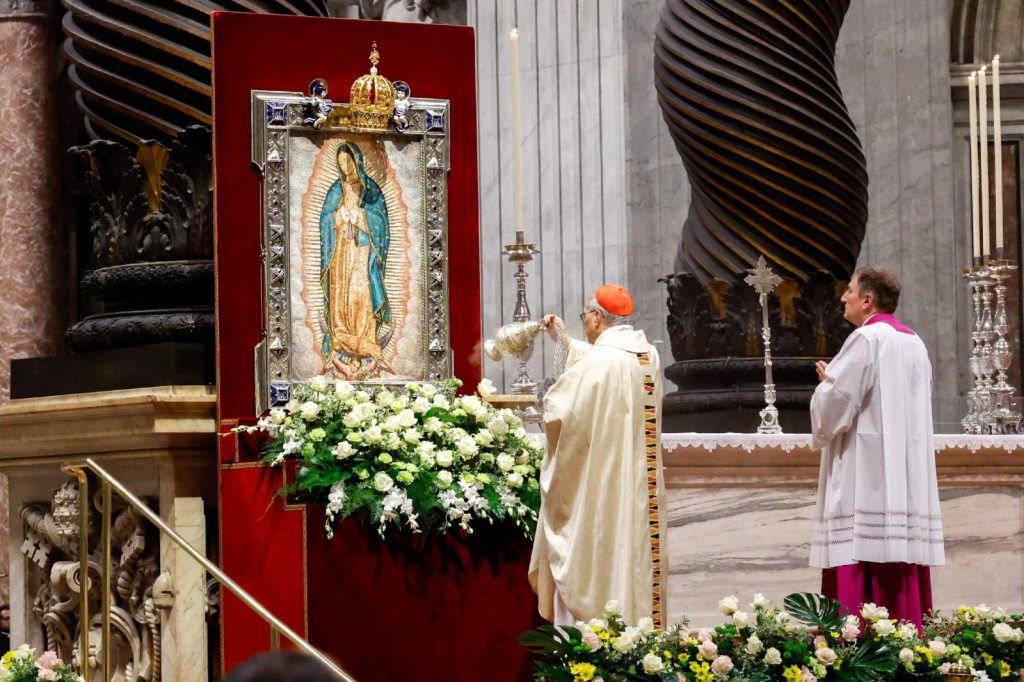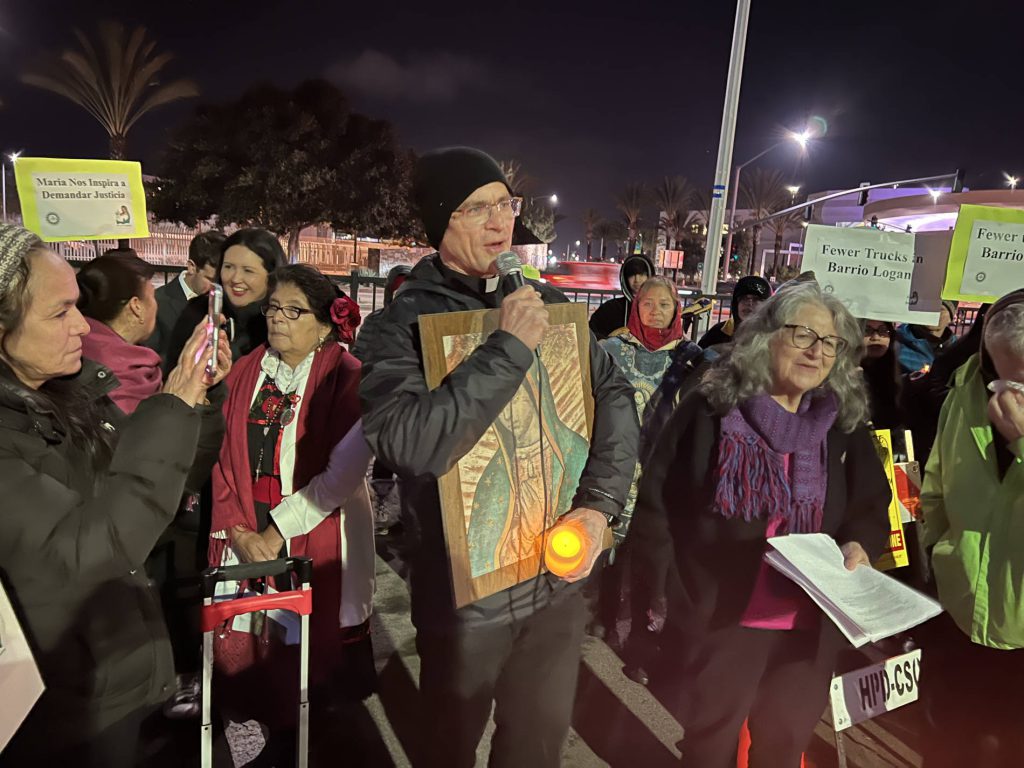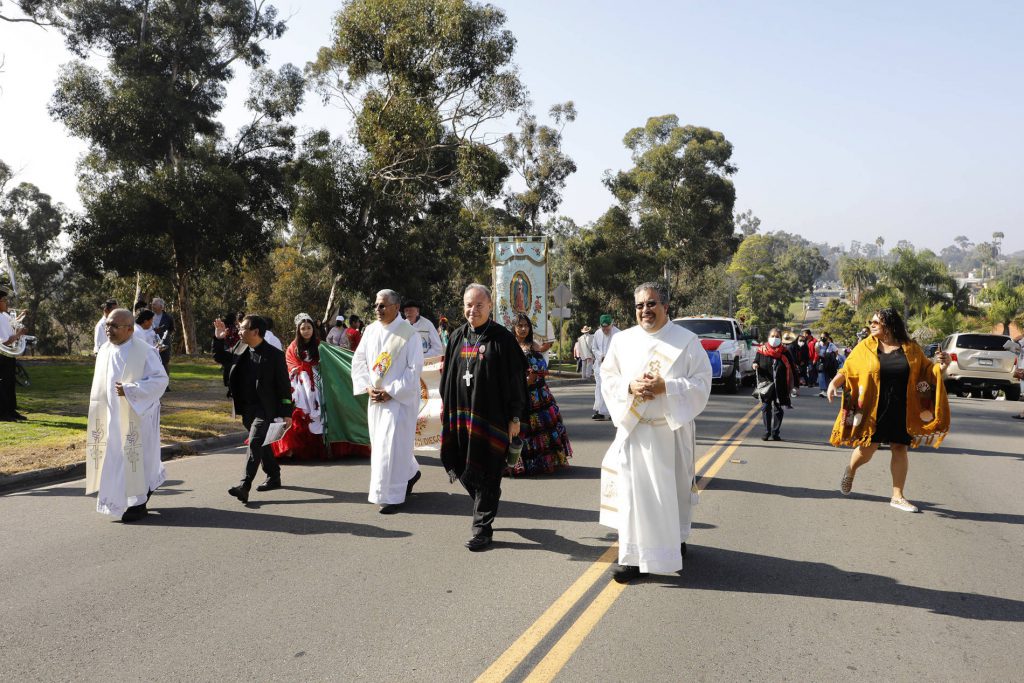SAN DIEGO — A year ago, members of Our Lady of Guadalupe Parish raised their voices to oppose a project that would have diminished the already poor air quality in its Barrio Logan neighborhood. Two months later, the project was abandoned.
On the heels of that success, the parish has continued to welcome opportunities to put its faith into action through civic engagement. In doing so, it re-energized a tradition of social activism led years ago by its late pastor, Jesuit Father Richard Brown.
In late 2022, Mitsubishi Cement Corp. sought to build a warehouse at the 10th Avenue Marine Terminal, which would have dramatically increased diesel truck traffic in the area.
Around that same time, the parish was in the midst of a period of self-examination, after having recently welcomed a new leadership team.
“We, as a parish, were talking about how we could organize ourselves to put our faith into action … and not just pray for justice, but really work for justice,” the pastor, Jesuit Father Scott Santarosa, explained.
While the parish has had “a long history” with the San Diego Organizing Project (SDOP), an interfaith organization focused on social justice, Father Santarosa said, “More recently, we have stepped up our game a little bit and been more visible in terms of putting our faith into action.”
The parish’s activism surrounding the proposed cement storage facility represented “a significant step in that direction,” he said.
The Environmental Health Coalition had reached out to the parish, seeking allies in its campaign against the warehouse project.
Jesuit Father Brad Mills, a parochial vicar of Our Lady of Guadalupe Parish, said that he had been surprised when presented with data showing that Barrio Logan had “some of the worst air quality in the country” and “some of the highest asthma rates.”
Among longtime residents of the barrio, there is the feeling that the city sees the neighborhood as “a place where it’s okay to pollute,” he said, noting that lower-income areas with high percentages of racial minorities often seem to have disproportionately high levels of pollution.
“None of us are against cement; none of us are against industry,” said Father Mills. “We all benefit from that, to one extent or another. The question is: What communities bear the brunt of that?”
After Sunday Masses on Nov. 27, 2022, more than 500 parishioners signed letters opposing the warehouse project then being considered by the Board of Port Commissioners. The signature-gathering effort was led by A Faith That Does Justice, a parish organization that encourages parishioners “to live out the Gospel and put their faith into action through acts of social justice.”
Father Santarosa said that about 100 parishioners gathered “on a cold Dec. 12,” the Feast of Our Lady of Guadalupe, for a prayer vigil at the Port of San Diego. The evening event included songs, recitation of the rosary, and testimonies.
Both Fathers Santarosa and Mills underscored that the event was a prayer vigil, not a protest.
Father Santarosa said, “I think our unique role in that moment was bringing a faith community’s voice and prayer to a concrete issue.” (No pun intended.)
Father Mills noted that parishioners’ opposition to the warehouse was “rooted in prayer” and that they “drew on their faith as a source of strength” in their call for “a more just world.”
The day after the prayer vigil, about 60 to 70 people attended the port commissioners’ meeting, where they presented the signed letters of opposition. Though the board had been scheduled to vote on the proposal during that session, the vote was postponed.
Father Santarosa said that, at the invitation of Rafael Castellanos, chairman of the Board of Port Commissioners, the parish hosted a community forum on Jan. 18. Mitsubishi Cement Corp., the Environmental Health Coalition and other key players were able to share their perspectives on the warehouse project and address community concerns.
It was announced in early February that Mitsubishi Cement Corp. had abandoned the plan to build a storage facility at the Port of San Diego.
Father Mills acknowledged that “a variety of factors” led to that decision.
But, he said, “I would imagine that the pressure which the parish put on it perhaps played some role. I trust it did.”
Marta Flores, a longtime member of the parish, said it was “an honor and a privilege” to be asked to serve as emcee for the Dec. 12 prayer vigil.
Flores, 72, said her faith has been “grounded in social justice” since her youth. Reflecting on the successful campaign against the warehouse, she said, “I am very grateful to God for that experience.”
“This was our time,” she said, “and our community rose to the occasion with great faith, and love, and joy.”
Ashley Valentin Gonzalez, a recent college graduate, was among those who gave testimony during the prayer vigil.
“It’s an experience that is very beautiful and … it really shows the power of what community is,” she said.
Since the issue of the cement warehouse was settled, Our Lady of Guadalupe Parish has found other ways to bring prayerful witness into the public policy arena.
On May 7, the parish held another prayer vigil, this time outside the Edward J. Schwartz Federal Building in downtown San Diego, which is home to the San Diego Immigration Court. The event, an expression of solidarity with asylum-seekers, coincided with the expiration of Title 42, the emergency health authority that placed additional restrictions on immigration to slow the spread of COVID-19.
On Aug. 6, the parish had a Eucharistic procession to and from nearby Christ the King Parish, when California State Assemblyman David Alvarez spoke there about the Homelessness Prevention Act (SB 567).
Reflecting on his parish’s recent examples of civic engagement, Father Santarosa said that it’s “not enough to just pray inside of our beautiful church.”
“We, people of faith, really do have power and an obligation or a responsibility to use it. … I hope we always will step up to the plate and do our part in making God’s world what He wants for us.”
For Father Mills, the parish’s recent experiences illustrate that, if faith communities are invited “to take a stand” about important issues of life and justice, many people will “respond quite beautifully.”
He said, “I think that there is a willingness and a desire in people to put their faith into action.”
Decades ago, Father Brown led another generation inspired by their faith to act. He organized parishioners to advocate for social justice for their community on issues such as public safety, recreational facilities and housing. They held neighborhood rallies and appeared before public agencies such as the San Diego City Council.









